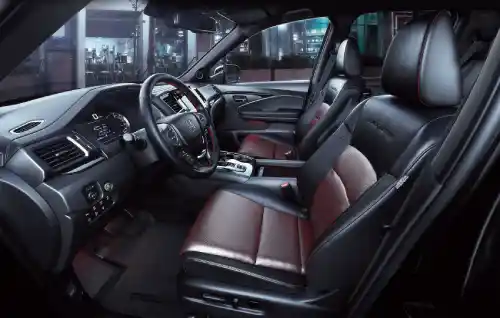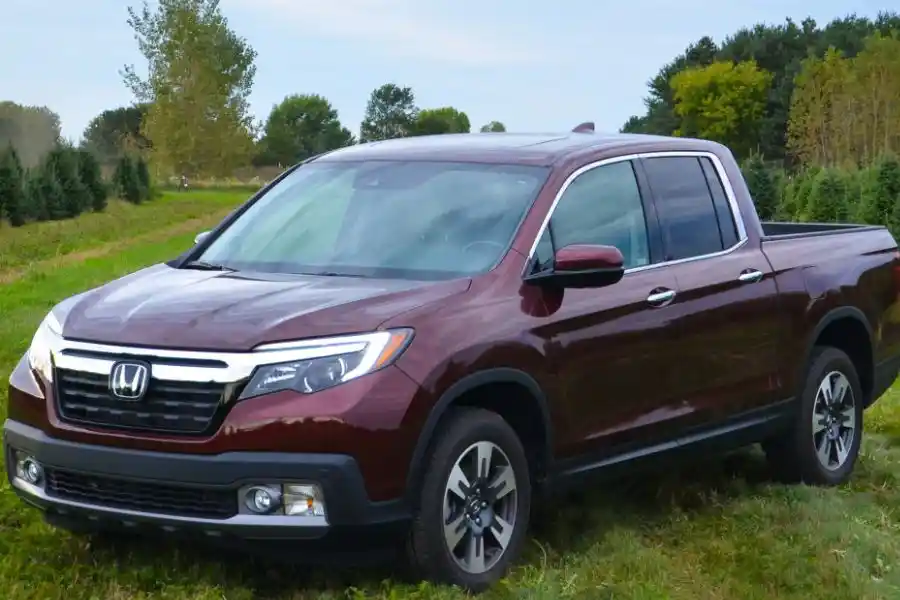There has always been a cluster of truck buyers open to the idea of the Honda Ridgeline: buyers looking for something distinctive and functionally flexible that combines rugged practicality with sedan comfort. However, one query does come to mind — is the Honda Ridgeline a good daily driver?
The Ridgeline has cut itself a niche in the midsize truck space with its mix of utility, creative touches, and ride comfort. In this article, we will learn whether or not this car fulfills the needs of a daily driving car, HOT for the money and everyday use!
Key Takeaways
- The Honda Ridgeline blends SUV-like comfort with the versatility of a pickup truck.
- Excellent ride quality and a refined interior make it ideal for daily commutes.
- Fuel economy and safety features are above average compared to other midsize trucks.
Overview of the Honda Ridgeline: A Unique Take on Daily Driving
The Honda Ridgeline defies pickup conventions. While other pickups seek to highlight rugged abilities and dirt-capable prowess, though, the Ridgeline is all about civility and convenience.
Though originally introduced back in 2006, its latest rendering still retains the iconic body structure that shapes its identity throughout its rivals. The body-on-frame construction common in most trucks will typically provide a rougher ride, a reason why this unibody construction would potentially make for a better daily driver.
Enter the Honda Ridgeline, which seeks to provide every ounce of truck capability—towing capacity, carrying ability, etc.—while keeping the comfort and driving dynamics of a midsize SUV.
Honda Ridgeline Daily Driver Pros:
- Smooth Road Manners: You feel significantly fewer rumbles through the body than in a conventional truck thanks to its unibody construction.
- Interior Quality: SUV-like interior with decent seats and tech.
- Fuel Mileage: Significantly better than most traditional body-on-frame pickups.
Why You Can Skip It:
- Off-road prowess is limited: The Ridgeline is more cosseting on city streets than it is on rough, off-road trails.
- Doesn’t appeal to traditional truck lovers: If you’re after a rugged old-school truck, you’re not going to choose this one.
Comfort and Interior Quality: A Crossover-Like Cabin
If you need to answer the question “Is the Honda Ridgeline a good daily driver?” you can take one of the strongest points: its comfort level. While a lot of more old-fashioned styles have that rugged-appearing cabin, the Ridgeline is lavish and roomy. Offering ample second-row leg and headroom, as well as accommodating up to five passengers in total, it is relatively comfortable on those long drives.

Inside the 2024 Honda Ridgeline, there are nice materials seen throughout the cabin. The seating is comfortable, and there’s the kind of storage you want to find in a family vehicle. The tri-zone climate control also keeps the cabin environment comfy, something you’ll appreciate in city traffic with conditions changing in a hurry.
- Higher trims have standard Heated Front Seats – a great feature to add in the cold weather.
- The Infotainment System features an 8-inch touchscreen with Apple CarPlay and Android Auto for seamless connectivity.
Likened to the Pilot SUV, which is roomy and well-considered out, the Ridgeline’s cabin over the years has often been likened favorably to that car. Its cabin is well isolated from outside noise, which comes in handy during long commutes or congestion and makes for a quiet ride in day-to-day driving.
Fuel Efficiency and Performance: Balanced for Daily Use
The Honda Ridgeline won’t perfectly match the more frugal smaller crossover SUVs but it will be more fuel-efficient than most pickup trucks. The fuel economy for the Ridgeline is assessed at 18 mpg in the city and 24 on the road, by the EPA.
The Ridgeline comes with a 3.5L V6 that’s good for 280 hp and 262 lb-ft. Of torque. The Ridgeline’s 9-speed automatic transmission smooths acceleration and straightens handling—two must-have elements of daily use.
All trims come with all-wheel-drive (AWD), which makes it more sensible for those of us who live in parts of the country with regular rain or snow. On the other hand, it does not come with a low-range transfer case for serious off-road driving—a compromise that allows it to outshine the paved road department.
Avg Daily Driver Key Stats:
- 0 to 60 mph in 6.5 seconds: Not sportscar fast but very respectable for a midsize truck.
- Towing Capacity: The Ridgeline can tow up to 5,000 pounds, the typical upper end of a weekend warrior’s needs.
Cargo and Utility: A Practical Bed for Daily Chores
However, the day’s real revelation was how well Honda uses space in the Ridgeline to make it one of the best daily drivers around. The Ridgeline has some innovative solutions, unlike the fill-in-the-blank cargo bed of many trucks. One of its more notable elements is the Dual-Action Tailgate, which can either swing open like a door or drop down to function like an everyday pickup bed.
This allows for quick access to the bed, something that comes in handy when loading groceries, luggage, or other gear during the day. There’s also the In-Bed Trunk, an area under the truck bed that can be securely locked for added functionality. It holds up to 7.3 cubic feet and has a drain plug for weekend cooler purposes.
This In-Bed Trunk is ideal for kickin’ around with a few buddies. This sort of flexible cargo area is not just useful for errands or the occasional weekend adventure, it also means that any daily driver with a space can transform from a workhorse to family hauler to adventure-mobile in a matter of moments.
Ride Quality and Handling: Smooth Like an SUV
It isn’t an exaggeration, either: The Honda Ridgeline may well be the most SUV-like truck on the market. That unibody frame helps deliver a comfortable ride, too and makes the Ridgeline feel more like driving a midsize SUV than a pickup truck. What this means for everyday usage is less body roll, fewer rattles, and smoother everything compared to body-on-frame trucks.
The independent rear suspension certainly keeps the ride more balanced, too, with city driving and even more extended highway cruises bearing far less of a ride penalty. Steering is light but direct, and the turning radius is surprisingly tight for a truck, which is an invaluable quality for squeezing through crowded city streets or parking where spaces seem a little small.
The most significant critique about traditional trucks is that, in everyday driving situations, they feel like lumbering pigs to operate—something Ridgeline’s nimble handling goes directly against.
Safety and Reliability: Peace of Mind for Daily Drivers
And while safety is one of Honda’s biggest strengths, it’s no different in the Ridgeline. The complete list of Honda Sensing features standard on all trims includes: Forward Collision Warning (FCW) with CMBS, Standard ACC, and standard LKAS.
If you’re planning on using it as a daily driver, that peace of mind adds weight, and the 2024 Honda Ridgeline scored a 5-star safety rating from the National Highway Traffic Safety Administration (NHTSA). Blind-spot monitoring and rear cross-traffic alert are other nice aspects, particularly in urban situations with busy streets and difficult traffic.
But Honda is always near the top of reliability surveys, and, therefore, the Ridgeline enjoys the benefit of that credibility. The Ridgeline has the potential to last well past 200,000 miles with regular care, so its longevity as a daily driver isn’t in question.
Is the Honda Ridgeline Cost-Effective for Daily Use?
Well, how much money do they want for the Honda Ridgeline? That factor is an important one when determining if Honda’s midsize is good as a daily driver. Pricing ranges from about $38,800 for the base model, the Ridgeline Sport, to about $46,230 for the fully loaded Black Edition. That may be a bridge too far for the average buyer, with the midsize truck price point I’d suggest being a bit too high considering competitors Toyota Tacoma and Ford Ranger come with lower entry points.
The value here is in what the Ridgeline is instead—one great truck capable of light-duty work and everyday driving. While the pricing is premium, you get standard AWD, a high-quality interior, and lots of safety features for your money.
In addition, the reduced fuel prices relative to body-on-frame pickups help it be much cheaper in the long run. Because of its unibody design, the Ridgeline has far fewer mechanical complexities to account for in the costs of ownership (maintenance and repairs), which means the price of ownership is usually lower than a traditional truck.
Cost Comparison Table:
| Feature | Honda Ridgeline | Toyota Tacoma | Ford Ranger |
| Base Price | $38,800 | $28,000 | $27,400 |
| Fuel Economy (MPG) | 18 city / 24 highway | 20 city / 23 highway | 21 city / 26 highway |
| Towing Capacity (lbs) | 5,000 | 6,800 | 7,500 |
Conclusion
So, is the Honda Ridgeline a good daily driver? To encapsulate, definitely—if you appreciate comfort, the utility of a truck, and the latest in vehicle tech. Like a truck with the ride quality one expects from an SUV and enough day-to-day practicality for anyone but the heaviest impressors and half-heaviest recreationalists.
For the sort of person who requires a truck but desires none of the corresponding harshness or mass, the Ridgeline is ideal. Was this review helpful to you? Check out some of our other reviews and articles to make sure you’re best set for your day-to-day!

